Men declare that necessity is the mother of all invention: in Bhuira, a small, calm and serene village in Himachal Pradesh however, the jam business set up by Linnet Mushran, is driven more by passion than by necessity.
Nestled in a secluded corner of Sirmour hills, where development hasn’t thrust a way forward, and where un-tarred roads cry for attention, Linnet accidentally stumbled upon a business opportunity to set up a jam factory in the midst of luscious orchards on the hill slopes of Rajgarh.
Famous as a ‘Peach Bowl’, the conducive climatic conditions make the region ideal for production of stone fruits such as peaches, apricots, cherry, plum, and others. Add to this equation, hard working locals has helped Linnet’s jam business scale new heights over the past 16 years, scaling up the annual production from 20 tons to 70 tons with a goal of 250 tons.
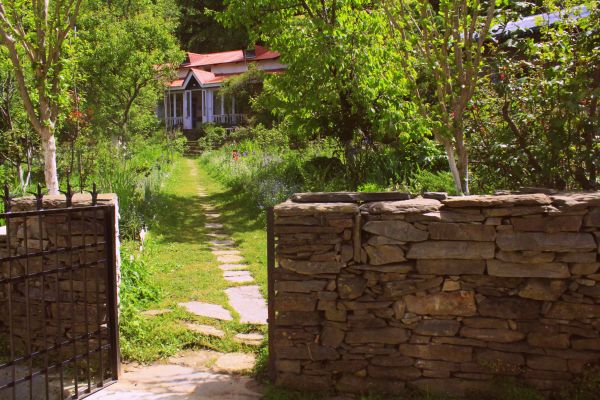
How she came to be part of the quiet and hardworking Bhuira village community, Linnet vividly recalls,
It was in 1991, when we drove to Bhuira in an Maruti Omni Van, where P.N. Haskar, a close relative had built a beautiful cottage. Its the one where I live now. Seeing the house instantly overwhelmed me and rekindled my love for mountains. The next thing I knew was that I wanted to buy the house.
Gleefully, she laughs:
Buying property from a family member basically means the money remains in the family only.
Today, Bhuira Jam factory, set up in a stone and slate premises is a beautiful sight that is surrounded by apple orchards and verdant deodar forests. The factory brims with merry mountain women extremely skilled in jam making as a method of fruit preservation under the tutelage of Linnet. All in a day, under very hygienic conditions they prepare an assortment of jams, jellies, fruit preserves, marmalade and chutnies.

Linnet spills a business secret,
Where all stone fruit is purchased locally; oranges, grapes and lemons are brought in from Nasik. The jams are more than 50% whole fruit, and have a semi-liquid consistency, a true mark of good jams. In addition, they have zero preservatives, and still retain a shelf life of up to 2 years.

The setting up the factory allows marginal farmers to sell their produce locally. They no longer have to struggle with middlemen, strict mandi bargains or distress sales. Women and girls too have an opportunity to substitute family income by working at the jam factory.

Since its inception in 1999, a new component has come into play about the popularity of Bhuira jams; it has evolved into an all-women organization.
Women take a lot of pride in these jams, named after their village. Really, it is their unconditional dedication to jam making that has brought us so far. From the beginning, I found that women were more honest. In all these 16 years, there has not been one incident of them cheating on me. I live in peace with them handling the factory even behind my back. They are now able to work on computers, and we also have laptops for them.

At 73, Linnet, British by birth and Indian at heart, is a spark in herself; always radiant, as if lit by a fire from within. Her passion for jam making feeds her steps, and her warmth lightens up the Bhuira campus. Her energy radiates through her precious garden, her lovely cottage hidden behind the orchards, and a kiwi tree canopy, under which we sit together to chat about her journey. We are joined by Rebecca, her daughter-in-law, who lives in Mumbai and visits Bhuira every month.
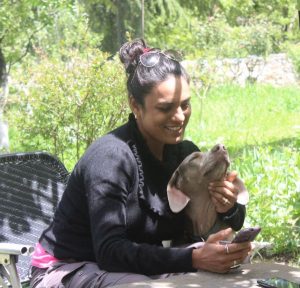
Linnet affectionately introduces her as:
The new face of Bhuira.
Rebecca in return delights in telling us about Linnet’s voyage from England to India.
Rebecca chuckles:
Linnet and Viney were so madly in love that Linnet dared to ignore cultural barriers and decided to come to India to get married to him. She deliberately tried to tan her skin to look more Indian. And although she came with trunks full of caps and dresses, the moment Linnet touched the Indian grounds; she fell in love with the saree.
Connecting the dots, Linnet continues
I enjoyed spending time in the jungles of Bihar before moving to Delhi. Back then, my husband was in charge of explosives manufacturing in Bihar for Indian Explosives.”
From this point, she quickly rebounds to Bhuira and jam making. She time travels into the late 1990s when:
One day we tried making apple jelly, here in Bhuira, without any proper pans or pots. Fortunately, it turned out well and was relished by neighbors and women from the village. They loved it so much that next time we set some jam in drinking glasses and distributed them around.
Inspired from the response and encouraged by local villagers, I finally decided to set up the first jam factory in 1999, which you now see as the stone and slate structure. We expanded little by little, and soon applied for FPO license.
With production increasing, we needed a cold storage, because what a waste it would be to let fresh fruit rot, and also we needed to maintain a consistent production line throughout the year.
The newly installed cold storage can now store up to 10 tons of fruit.
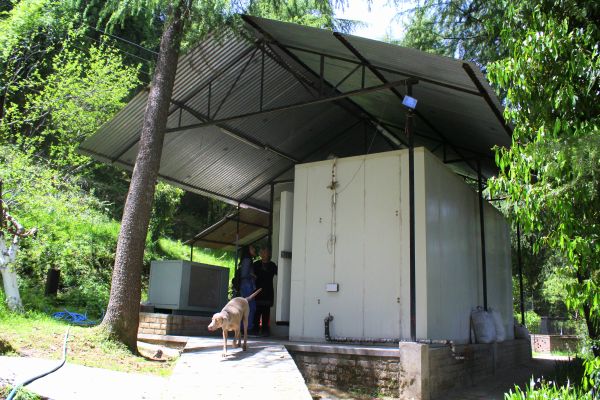
Adjoining the cold storage unit is Linnet’s bamboo office, which hangs with a lobe of rhododendron flowers, which Linnet tells us:
The locals always hang one outside their door, so I did it too.

Linnet has a constant companion by her side, a Weimaraner rescued from Friendiscoes, named Chipku. Chpiku follows Linnet everywhere, and is a friendly pet adored by everyone on the campus.
The stone factory, right next to Linnet’s house is under renovation:
In the past few years, the ants here have become a problem. The cozy environment inside the factory plus the sweet jams is very inviting, which lets them thrive even in these cold parts. We’re getting new tiles on the wall that should prevent ants from inhabiting the place.
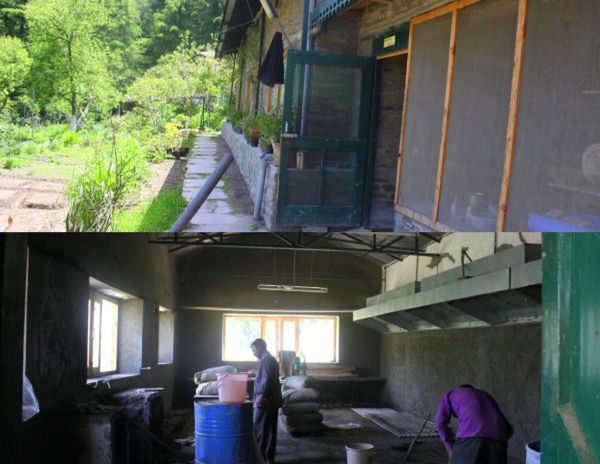
Although excited by the renovation, her heart sinks as she tells us about her disappointments with the government.
Unfriendly business policies in the state have always taken a toll on me. Every time I see a brown envelop at the door, my stomach starts churning. The government puts too many restrictions and doesn’t value how our jams are generating employment and helping the local economy.
Marketing has also been slightly difficult for me, as I’m not really a business woman. I’m a jam maker, who has been working for years incurring losses. Earlier, we had partnered with Earthy Goods for marketing, but later parted ways with them. Luckily, my daughter-in-law, Rebecca now looks after marketing and we have new guys on-board, who are promising too.
My son-in-law in Mumbai looks after the accounts, and I’m very grateful to my children for the support they lend to my cause. Moreover, the younger generation knows how to make business more viable and earn profits.
In lieu of expanding production, Linnet has set up a new plant, below in the valley, in a small village of Halonipul. Located near a small rivulet, the new factory was earlier an packing shed of HPMC, a government company. The shed has been taken up on lease. The additional plant has increased the annual production capacity to 250 tons, though only 70 tonnes of jams and preserves were currently being produced.
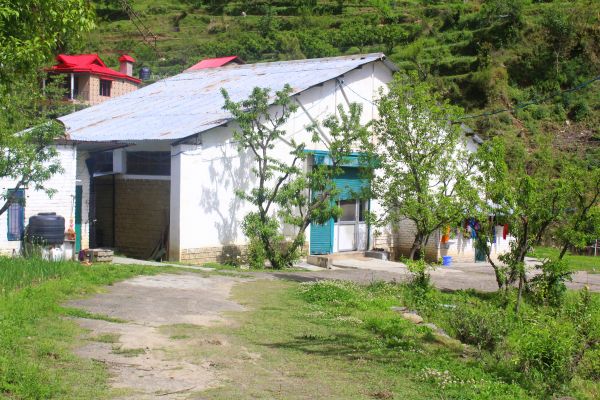
We have 9 permanent employees in each factory, and others are seasonally employed when the fruit comes in, Linnet discloses.
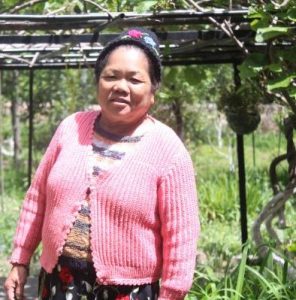
Belonging to the mountains, prodding up and down the hills is natural to these women. Ramkali, the first employee of the factory is believed to be the live wire at Bhuira. Everyone, including Rebecca, co-workers at the factory, even Chikpu, rejoice in Ramkali’s presence. She’s proudly annouces:
I’m older than the jam factory you know.
How strenuous is it to train women in jam making?
It usually depends on how quickly they can grasp, but in order to master the entire process, it could take up to 3 years. We make jam the conventional way, in 2 kg batches; the technique is quiet labor intensive. Everything from sorting the fruit, washing, cutting and cooking is done manually.
Linnet boasts:
Our women employees are not just good at jam making, they’re good managers too. None of them have studied past class 5, but they learn quickly. For instance, Sarita, in-charge of production is very accurate with numbers.
Rebecca, herself is a talented baker, and her excitement with Bhuira has no bounds. With twinkling eyes, she tells us:
40% of our stock is bought by Fab India. Devans, a popular coffee shop in Khan Market Delhi, has always been our favorite and most loyal retailers. Apart from that, L’Opera, a prestigious famous French patisserie in Delhi is also retailing Bhuira jams.
Her excitement goes a notch higher when she discusses her expansions plans:
Up till now, Bhuira jams are being retailed in limited states that include Delhi, Himachal Pradesh, Punjab, Uttarakhand and Goa, but now we plan to expand our reach. We also want to sell jams online, for which we’re already in talks with pepperfry.com.
On this happy confession, Linnet takes us around her special British style kitchen, from where we bid adieu and head down to the 2nd unit in Halonipul. It takes us about half an hour drive to get there
Where, apart from a few scattered villages, not many people live in the upper slopes of Bhuira, Halonipul bustles with a lot of activity. We are given special head gears before entering the factory. Sarita is very particular about her work. She takes us through the production areas in order of activities. Hygiene is of utmost importance here, and even though the plant seems to be a small enclosure, its daily production goes up to 850 bottles.

A single bite of Bhuira jams takes you through layers of flavors and leaves behind a little trial of fresh fruit lingering in the mouth. No doubt then, there’s a cult following of buyers, who get boxes of these jams shipped to distant place in order to maintain supplies.
Photo Credits: Supriya Sharma




Very nice story. Elegantly done. Good to learn about ‘Bhuria.’ These are the stories which need to be followed more. Unfortunately, such tales get lost in the noise of TRP and PV hungry mainstream media which takes shameless pride in highlighting that doesn’t deserve to be highlighted. Kudos once again. Qualifies to be in the same league as http://www.galli.in/
Such an inspiring story!! Started out as a small venture and now the success is amazing! The way the family has come together in this venture is heart warming, from Rebecca to the son in law.
Definitely need more people like you Linnet!!
I’m so glad to see Bhuira Jams in the news and written about so nicely. Way to go Aunty Linnet!
For the last ten years, no jam other than Bhuira is served in our house! This is true even after we moved to Delhi (temporarily, I hope) and my wife will drive thirty miles to pick up one of Bhuira’s strawberry jams (our favourite) rather than settle for anything else. This is an inspiring and delightful story. There are many such small and visionary entrepreneurs in Himachal who have succeeded in spite of the government, not because of it, and HILL POST could consider having a regular column on tracing them out and informing its readers about them through such informative write ups.
Enjoyed reading about Linnetes odyssey..
As an old ‘Simla Boy’ I congratulate Linnet Mushran and all those who work at the jam factory. It is a story of vision and hard work combined with honesty of purpose..
Next time I’m in India I’ll certainly bring back a few jars to the Welsh Hills where I live.
Do they also make guava jelly / cheese ?
I have already seen bhuria jam factory but after read this story I want to see again the jam factory and meet to great lady
kindly find the person who can make organic strawberry jam at home kindly contact me 9892017460 ( Gateway Of India ,Mumbai)
Hello Pratima ji, can you please help me connect with Rebecca or somebody from Bhuira. Their website is down and I couldn’t find any other option to contact them. Maybe you can share their mail id or any contact detail over my mail id.
Thanks 🙂
How can I buy your jams in England ? I had them when I visited Shimla a few weeks ago.
Dear sir/madam
I have just visited Simla and buy your product pict plum chutney, very nice and very tasty, I have take direct from home , I am from Mumbai , I try your other items also , Thanks
Dipak shah – Mumbai – 9022148209
for Ms kalra
write about dried pears
After trying several “marmalades” I stumbled on Bhuira marmalades and there was no looking back. At first I bought the marmalades from other web sites. But after getting to know Bhuira web site, I have been buying only from there. The lemon marmalade is really great.